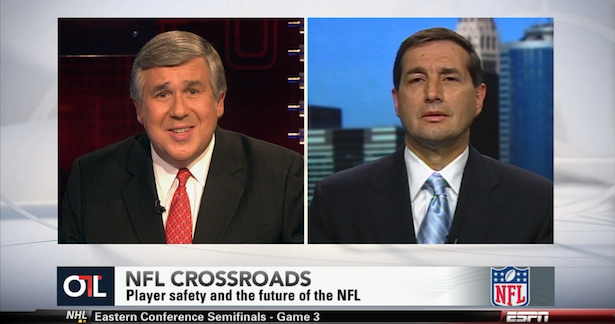D'OH! Time to get a new mirror!!
I have to give credit where credit is due. ESPN taking a look in the mirror, is a good thing, a very good thing. It is an exercise we should all engage in from time to time. And they got input from a trusted accountability partner in the well-respected Poynter Institute. All good preliminary steps, so I began reading the article with a bent towards "Aha, ESPN getting their come-uppance", maybe issuing a mea culpa or two. Some red meat for the blogosphere. And that was in there as well, if I chose to focus on that angle.
But then the tables were turned...
One of the areas that jumped out at me was the section where they turned the mirror around on US!?! -- the consumer of the product called ESPN and its family of networks -- and said "We get the ESPN we deserve". Ouch!!
Now initially, that charge could be received in a defensive manner. A reflexive "Why are they blaming the victim for their excesses as a network? Aren't they just passing off the responsibility for these excesses?" type of response could easily be warranted.
Except for one thing. They are absolutely right!! Touché mon ami.
As noted in the article, we get the screaming, arguing in your face, contrived drama of a show like "Numbers Never Lie" and then in the aftermath wonder why the society is so uncivil. We wonder in hindsight, why we can't talk to one another in a civil manner without arguing. But it is this type of dumbed down, ratcheted up contrived drama for the sake of our entertainment that we demand. The ratings numbers tell them that is what we want. We have met the enemy, and he is us.
Therefore, instead of more shows like Outside the Lines -- which IMO is one of the best works that ESPN does -- we get the game-show, carnival barking, contrived drama and faux-confrontation / controversy laden First Take.
Here's the game-plan fellas:
Here, you take this side of a so-called polarizing issue related to sports, I'll take the other side and we'll just yell at each other and not figure out a darn thing about anything. We won't advance education, knowledge or understanding of an issue, not one little bit. We'll just spew enough talking points and catch-phrases that our audience will feel emboldened around the water-cooler or coffee-maker to make commentary on issues they have no more than a surface understanding of. Nice!!!
Can I get a BOO-YAH!!! Go ESPN!!!
One guy is the heel, one guy is the face, and we the consumer -- are the marks. Just like old-school wrestling.
The lesson learned is that if we eat it up, they will package it according to our tastes. A reverse "if you build it, they will come" formula for success.
We ask for it, we get it. That's the message.
Lesson learned, school is out!! Thanks ESPN, for pointing that out. At least now we know.
Ratings are king, money talks, BS walks. Yeah, yeah we know, we know.
Maybe it's time we turned the table on ESPN and it's formula in this area. Don't you think?
Ask for better, you just might get it.
One of the worst shows ESPN does, garners the ratings
One of the best shows ESPN does, plays to crickets
from ESPN.com
Finale: ESPN’s size, power demand scrutiny - Poynter Review Project Blog Blog - ESPN:
We get the ESPN we deserve: With a few exceptions, during our tenure, we shied away from media criticism except where ESPN’s own standards and practices came into question. Media criticism wasn’t our job, and there’s no shortage of thoughtful critics keeping an eye on ESPN.
But we still got an earful of such criticism from readers who emailed us. And some of what they consistently decried came down to questions of taste -- which, ultimately, are questions about ratings.
For example, take comments from “Numbers Never Lie” co-host Michael Smith at the recent Blogs With Balls conference. We once called “Numbers Never Lie” a bait and switch -- a show that purports to be about advanced stats but is really just another venue for arguments about heart, momentum and other sports generalities.
Smith’s comments at the conference fell along similar lines: He said that “Numbers Never Lie” began with different goals but “now is a debate show, like most other shows on ESPN. ... I hate to say it’s not about analytics, but it’s not about analytics.”
Unfortunate, but why did that happen? Because, Smith said, ESPN’s research found most viewers didn’t want to watch a show with statistics that had to be explained to them. We’ve heard similar things from other ESPNers; they like smart, dispassionate shows such as “Outside the Lines” as much as we do, but those shows don’t consistently pull in the ratings of, say, “First Take.”
A steady diet of debate shows rather than programs such as “Outside the Lines” might strike some viewers and critics as an unfortunate choice; we said as much, in fact. But such choices don’t amount to violations of ESPN’s standards. Yes, ESPN “plays the hits,” to use the expression we heard a number of times. But television is a hits-driven business. The real question might not be why we get so few shows such as OTL – it’s why we get such shows at all. If readers want such fare -- say, more “30 for 30” and less “Around the Horn” -- they need to vote with their remotes.
'via Blog this'
ABOUT THE POYNTER REVIEW PROJECT

No comments:
Post a Comment